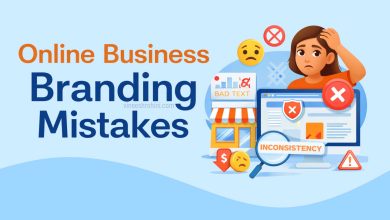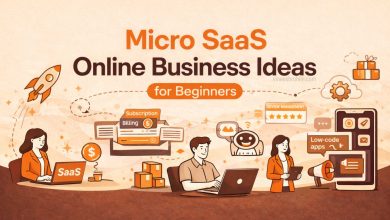Profitable Online Business : 7 Must-Know Strategies for Success – Comprehensive Guide
Profitable Online Business : In today’s digital era, starting an online business is one of the most effective ways to achieve financial success and independence. With the growing accessibility of technology and the increasing trend toward online shopping and services, more entrepreneurs are venturing into the online marketplace. Compared to traditional business models, online businesses often have lower startup costs and provide the flexibility to reach a global audience.
Profitable Online Business – Table of Contents
Profitable Online Business

However, thriving in the online business space requires more than just having a good product or service. It involves strategic planning, consistent effort, and a deep understanding of various business dynamics. This essay will outline seven essential strategies for building a profitable online business, helping you navigate the competitive landscape and achieve sustained success.
1. Find a Profitable Niche
One of the most critical steps in starting an online business is identifying a profitable niche. A niche is a specific segment of the market that you focus on, catering to the unique needs of that audience. Finding the right niche can make the difference between a thriving business and one that struggles to gain traction.
How to Identify a Profitable Niche
- Research Market Demand: Use tools like Google Trends, keyword research tools, and social media platforms to identify what people are searching for. Look for niches that have a high level of interest but are not overly saturated.
- Evaluate Competition: Analyze your potential competitors. While a certain level of competition indicates a healthy market, too much competition can make it challenging to stand out. Look for gaps in the market where you can offer something unique.
- Leverage Personal Passion and Expertise: Your niche should ideally align with your interests and expertise. This not only makes the business more enjoyable to run but also positions you as an authority in your field.
Example
Suppose you are passionate about fitness and have expertise in yoga. Instead of targeting the broad fitness market, which is highly competitive, you could focus on a niche like “yoga for seniors” or “yoga for stress relief.” This allows you to cater to a specific audience and stand out in a crowded market.
2. Turn Your Knowledge and Skills into Cash
Once you have identified your niche, the next step is to monetize your knowledge and skills. This involves creating products or services that offer value to your target audience. There are several ways to do this:
Monetization Strategies
- Create Digital Products: E-books, online courses, and webinars are excellent ways to package your knowledge. These products can be sold repeatedly without additional production costs, making them a scalable income source.
- Offer Consulting or Coaching Services: If you have expertise in a particular area, you can offer consulting or coaching services. This could be done one-on-one or through group sessions. Platforms like Zoom and Skype make it easy to connect with clients globally.
- Freelancing and Contract Work: Websites like Upwork, Fiverr, and Freelancer allow you to offer your skills as a freelancer. Whether it’s writing, graphic design, web development, or marketing, you can find clients willing to pay for your expertise.
Example
If you have expertise in digital marketing, you could create an online course teaching small business owners how to market their products online.
You could also offer personalized consulting services to help businesses develop their marketing strategies.
3. Build a Strong Personal Brand
In the crowded online business space, having a strong personal brand is crucial. Your brand is what sets you apart from the competition and helps you connect with your audience on a deeper level. A personal brand is more than just a logo or website; it’s the perception people have of you and your business.
Steps to Build a Strong Brand
- Define Your Unique Value Proposition (UVP): Clearly articulate what makes you different from others in your niche. What unique value do you offer to your audience?
- Create a Professional Online Presence: This includes a well-designed website, active social media profiles, and consistent branding elements like logos, colors, and fonts.
- Share Valuable Content: Regularly publish high-quality content that provides value to your audience. This could be in the form of blog posts, videos, podcasts, or social media updates. The goal is to establish yourself as an authority in your field.
- Engage with Your Audience: Respond to comments, answer questions, and engage in conversations. Building a community around your brand fosters trust and loyalty.
Example
Consider a health coach specializing in plant-based nutrition. By sharing recipes, tips, and success stories on social media and through a blog, the coach can build a following. This helps in creating a strong brand identity, making it easier to sell coaching packages, e-books, or online courses.
4. Master Marketing and Sales
Having a great product or service is not enough; you need to know how to market and sell it effectively.
Buy Now : Ecommerce Website With 100 Products – Profitable Online Business
Marketing and sales are the lifeblood of any business, and mastering these skills can significantly increase your chances of success.
Marketing Strategies
- Content Marketing: Create valuable content that attracts and engages your audience. This could be in the form of blog posts, videos, or infographics that address the pain points of your target market.
- Social Media Marketing: Use platforms like Instagram, Facebook, LinkedIn, and Twitter to reach and engage with your audience. Paid advertising on these platforms can also be an effective way to reach a larger audience.
- Email Marketing: Building an email list is one of the most effective ways to nurture relationships with your audience. Use newsletters, promotions, and personalized emails to keep your audience engaged and drive sales.
Sales Techniques
- Develop a Sales Funnel: A sales funnel guides potential customers through the buying process, from initial awareness to making a purchase. This involves creating a series of steps, such as landing pages, email sequences, and calls to action, to convert visitors into customers.
- Utilize Upselling and Cross-Selling: Once a customer has made a purchase, suggest additional products or services that complement their purchase. This increases the average transaction value and boosts revenue.
Example
A digital marketing agency might use content marketing to attract potential clients by publishing case studies and success stories. They could then use a sales funnel to capture leads through a free consultation offer, followed by email marketing to nurture those leads until they are ready to sign up for a full-service package.
5. Have Multiple Sources of Income
Relying on a single source of income can be risky, especially in an online business where market conditions can change rapidly. Diversifying your income streams not only provides financial stability but also maximizes your earning potential.
Ways to Create Multiple Income Streams
- Affiliate Marketing: Promote other people’s products or services and earn a commission for every sale made through your referral. This can be a great additional income stream, especially if the products align with your niche.
- Ad Revenue: If you have a blog or YouTube channel with significant traffic, you can earn money through advertising. Platforms like Google AdSense or YouTube Partner Program allow you to monetize your content with ads.
- E-commerce: In addition to digital products, consider selling physical products through platforms like Shopify, Amazon, or Etsy. You can also use dropshipping to sell products without holding inventory.
- Membership Sites and Subscriptions: Offer exclusive content, services, or products through a membership site. This creates a recurring revenue stream as members pay a monthly or annual fee for access.
Example
A fitness blogger could have multiple income streams, including ad revenue from their blog, affiliate commissions from promoting fitness products, income from their own e-books and online courses, and monthly membership fees for a private community offering personalized workout plans and diet advice.
6. Reinvest Your Profits
Reinvesting profits back into your business is essential for growth. Rather than spending all your earnings, allocate a portion of your profits towards activities that will help scale your business.
Reinvestment Strategies
- Improve Your Product or Service: Use profits to enhance the quality of your offerings. This could mean developing new features, improving customer service, or investing in research and development.
- Expand Marketing Efforts: Increase your advertising budget, explore new marketing channels, or hire a professional to manage your marketing campaigns more effectively.
- Invest in Technology and Tools: Tools that improve productivity, analytics, and customer experience can provide a significant return on investment. This could include CRM software, email marketing tools, or even upgrading your website.
- Hire and Outsource: As your business grows, you may need to hire staff or outsource tasks to professionals. This allows you to focus on strategic aspects of the business while experts handle the operational tasks.
Example
An online retailer who sees a surge in sales during the holiday season could reinvest a portion of the profits into upgrading their e-commerce platform, improving the user experience, and expanding their product range. This not only increases sales but also enhances customer satisfaction and retention.
7. Maintain Consistency
Consistency is key to building a successful online business. Whether it’s posting content, engaging with your audience, or improving your products and services, regular and consistent efforts are what set successful businesses apart from the rest.
Tips for Maintaining Consistency
- Set Realistic Goals: Define what consistency looks like for your business. It could be posting on social media daily, publishing a new blog post every week, or sending out a newsletter every month.
- Create a Content Calendar: Plan your content in advance. This helps in maintaining a steady flow of content and ensures that you are not scrambling at the last minute.
- Automate Where Possible: Use automation tools for tasks like scheduling social media posts, sending emails, and even managing ad campaigns. This saves time and ensures that your business runs smoothly even when you’re not actively working on it.
- Monitor and Adjust: Regularly review your performance metrics to see what’s working and what isn’t. Adjust your strategy as needed to stay on track and achieve your goals.
Example
A YouTuber who commits to uploading two videos per week will likely see better growth and engagement compared to one who posts sporadically. Consistent posting builds anticipation among subscribers and helps the channel grow steadily.
Profitable Online Business – Conclusion
Building a profitable online business is both an exciting and challenging endeavor. By focusing on finding the right niche, monetizing your skills, building a strong brand, mastering marketing and sales, diversifying income streams, reinvesting profits, and maintaining consistency, you can navigate the competitive landscape and achieve lasting success.
While there is no one-size-fits-all approach to success, these strategies provide a solid foundation for any aspiring online entrepreneur. With dedication, persistence, and a willingness to adapt, you can turn your online business into a profitable venture and create a sustainable source of income for the future.
Keywords : Profitable Online Business , Profitable Online Business 2024 , New Profitable Online Business , Profitable Online Business new , Profitable Online Business in India



